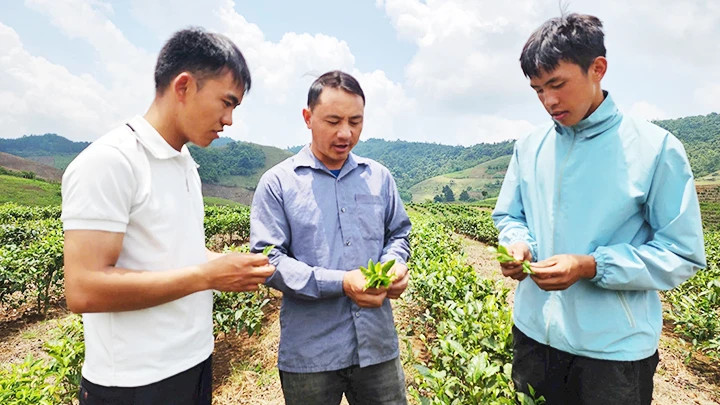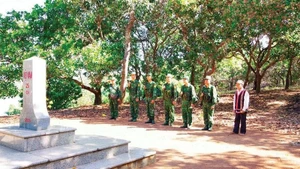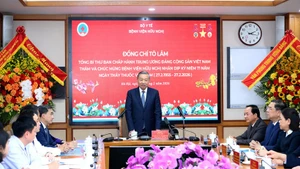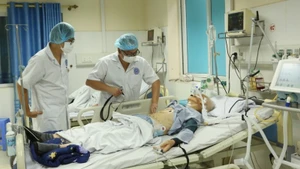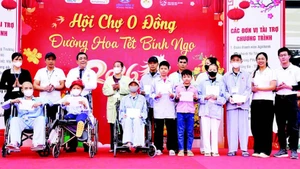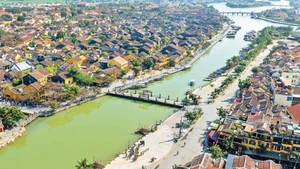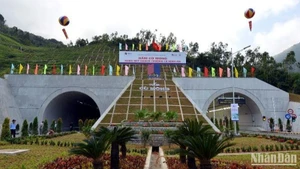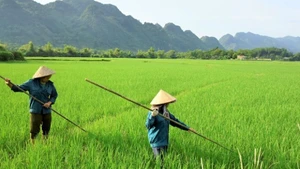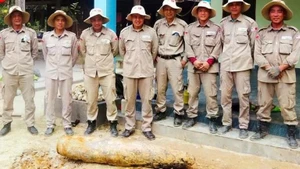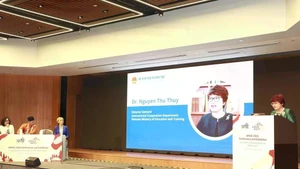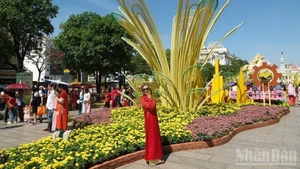Faced with this situation, at the end of 2021, the Standing Committee of the Moc Chau District Party Committee issued a special resolution to create a significant transformation at the grassroots level.
Opening the path out of poverty
More than three years of implementation of Resolution No. 09-NQ/HU, Moc Chau borderland is undergoing a steady transformation. Economic development models have begun to prove effective, harnessing the strength of the people to safeguard the land and their hamlets. Located 7 km from the centre of Long Sap Commune, Phieng Cai Hamlet was once notorious for drug-related issues and poverty. Today, a concrete road leads right into the hamlet, which has maintained its “four no’s on drugs” status. Notably, in December 2024, Phieng Cai met all the criteria to become the first border hamlet in Moc Chau to achieve new-style rural area status.
“Before 2015, our lives were extremely hard. With government support, people gradually shifted to economically viable crops like tea, pears, plums, passion fruit, and livestock such as cattle and pigs. Now, the average income of people has reached over 40 million VND per person per year. There are no longer any poor households in the hamlet,” said Trang A Tua, Secretary of the Party cell and Head of Phieng Cai Hamlet.
“Implementing Resolution 09, the commune has focused on consolidating grassroots political systems, developing passion fruit and tea cultivation and cattle farming, and investing in infrastructure for the hamlets. As a result, the quality of life has visibly improved, and security and public order have been maintained,” noted Lo Van Nuoc, Secretary of the Long Sap Commune Party Committee.
From Phieng Cai, the story of change continues in Cang Ty, a highland hamlet in Chieng Khua Commune, where over 50% of households are poor, mostly of the H’Mong ethnic group. Dilapidated houses have now been replaced with solid dwellings thanks to the joint efforts of organisations. In her new home, Mua Thi Giang recounted emotionally: “In the past, we were in despair. My husband was addicted to drugs, the house leaked, and the children went hungry. Now my husband has undergone rehabilitation to quit drugs, our three children are in school, and we have a proper house. I feel at peace now.”
The determination to eliminate temporary and dilapidated housing for poor households, particularly in the ten border hamlets, is a major priority for Moc Chau Town.
“With support from the Moc Chau Town, the commune has mobilised organisations to work together to replace substandard housing with new solidarity homes for poor households in border hamlets. So far, six households have new homes in use. In addition to stable shelter, these households are also being guided in production to increase income and improve living conditions,” said Ha Van Muoi, Chairman of the Chieng Khua Commune People’s Committee.
In Chieng Son Commune, two border hamlets of Pha Luong and Suoi Thin now have Party cells, eliminating the previous situation of having no Party members.
“We’ve defined political system consolidation as the key; socio-economic development as the foundation; and ensuring national defence and security as the pillar to safeguard the land and the people,” affirmed Phan Thanh Hoang, Secretary of the Chieng Son Commune Party Committee.
Motivation to safeguard the land and the people
After more than three years of implementing Resolution No. 09-NQ/HU, 35 billion VND has been mobilised to build 14 essential infrastructure projects, 12 of which have been completed and put into use. Roads within hamlets and routes to production areas have been paved, facilitating travel and transport of agricultural goods. Street lighting has been installed on major roads, improving living conditions and public security.
Livelihood development models have been implemented suitable for the conditions of each hamlet and household. Over 365 households have received support in seedlings, fertiliser, and production techniques. In 2024 alone, ten effective agricultural models were established. Since 2021, working groups have held 41 training sessions for nearly 740 participants, and distributed 11,498 passion fruit seedlings, 21,500 tea plants, thousands of fruit trees, hundreds of cattle and pigs, and dozens of tonnes of fertiliser. As a result, the poverty rate in border hamlets has dropped to 10.8%. Drug-related crime has significantly declined, with many former drug addicts now rehabilitated and reintegrated into the community.
Alongside economic development, efforts in defence, security and grassroots political system building have been synchronised. More than 6,300 residents have received legal communication; various self-managed community models, such as “Border landmark self-management groups” and the “Five-no, three-clean women’s union” continue to prove effective. Border guard forces not only maintain order and security, but also help strengthen Party organisations. Currently, 14 officers and Party members from Long Sap Border Post are assigned to participate in Party cell activities in hamlets; 34 Party members mentor poor households; and two officers serve as Deputy Secretaries of communes’ Party Committees.
According to Nguyen Thi Hoa, Vice Chairwoman of the Moc Chau Town People’s Committee, Resolution No. 09-NQ/HU aims not only to improve incomes and living standards, but more importantly, to show border residents the Party and State’s ongoing support and care. In areas once deemed “hot spots” adjacent to the “Golden Triangle”, Moc Chau is gradually building a drug-free region by 2030 through persistent efforts from the entire political system. Today, the most significant transformation lies in awareness; people are no longer passively reliant, but are instead seizing opportunities to rise out of poverty and actively contribute to local development.
The roads leading into the hamlets, schools with lights on, and solid houses rising amidst the mountains and forests, all testify to the new vitality along the nation's frontier, where the people’s defence is steadily being strengthened.
